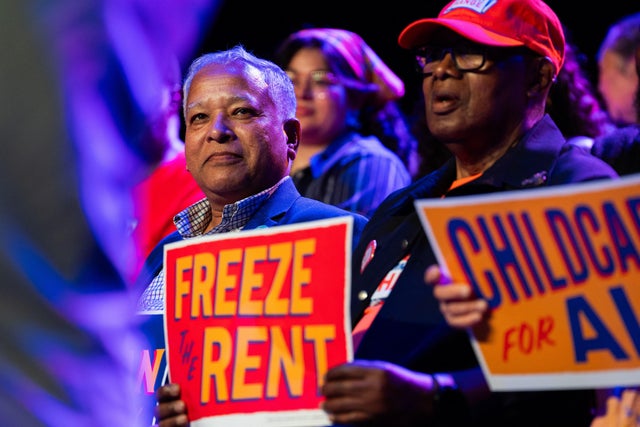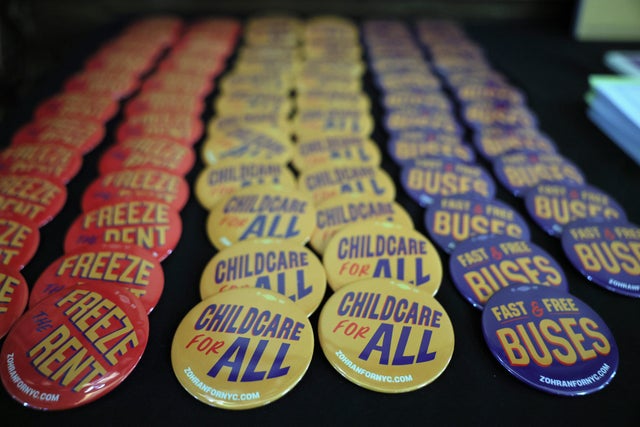Zohran Mamdani ran on a promise to freeze rent. Here's how NYC's mayor can control the rates.
New York City Mayor-elect Zohran Mamdani earned a decisive election victory with a campaign built on affordability, notably a promise to freeze rent for the city's 2 million residents living in rent-stabilized apartments.
From the rent freeze, to other promises, including free buses, city-owned grocery stores and universal child care, time will tell whether his proposals will become reality.
So what is rent stabilization, and how can the mayor influence the rates?
Mamdani's promise to freeze the rent
The democratic socialist has vowed to freeze the rent for all stabilized apartments throughout his full term, meaning the Rent Guidelines Board would keep the rates the same.
Mamdani criticized Mayor Eric Adams' administration for raising the rates all four years, noting former Mayor Bill de Blasio froze them during his administration.
Adams, for his part, made it clear he wasn't happy with the latest round of rate hikes, saying in a statement earlier this year, "While the board exercised their independent judgment, and made an adjustment based on elements such as inflation, I am disappointed that they approved increases higher than what I called for."
Adams went on to say a rent freeze wasn't the answer, either.
Mamdani's opponents in the mayoral race also came out against his proposal. Former Gov. Andrew Cuomo argued landlords must be able to keep up with rising maintenance costs, while Republican Curtis Sliwa called for minimal, constrained increases.
Can the mayor freeze rent?
As mayor, Mamdani will have sole power to appoint the nine members of the Rent Guidelines Board, which sets the rates each year for rent-stabilized apartments. Several of the board members' terms are up, and Mamdani says he wants to replace them.
"Only appointing those who understand that landlords are doing just fine. Last March, the board found that landlord incomes rose by nearly twice the increase of their expenses. The median income for a rent stabilized household is $60,000 a year. Any rent hike could push them out of this city," Mamdani said in a video on his campaign website, adding, "For those landlords who need a little extra help, there's a city fund they can apply to."
So while the mayor does not have the power to directly raise or lower rents, having his hand-picked board members in place would, theoretically, put him in a position to influence their decision.
No rubber stamp
Political expert J.C. Polanco, a professor at the University of Mount Saint Vincent in the Bronx, said it's not as simple as the Rent Guidelines Board rubber-stamping what the mayor wants.
"Legally, each member of the Rent Guidelines Board has to review the law and the economic forecast that landlords are currently experiencing, so they're not allowed to vote, just ... without any studies, just on a whim to freeze the rent. They have to launch studies and analyze the numbers and see whether or not a rent freeze is valid, considering the economic circumstances that impact the city," Polanco said before the election.
How NYC's rent stabilization works
Enacted in 1969, rent stabilization is a system of rent regulations put in place after rents rose sharply in post-war buildings. In the years since, the system has expanded to include nearly 1 million apartments in New York City.
The rates that tenants pay are set each year by the Rent Guidelines Board, with the annual dance pitting tenants against landlords -- both sides arguing they shouldn't have to cover rising costs of things like maintenance, utilities, insurance and taxes.
While rent-stabilized units make up only a portion of apartments citywide, the hikes are often used as guideposts for market rate buildings, as well.
Earlier this year, the board voted 5-4 in favor of a 4.5% increase for two-year leases and 3% increase for one-year leases -- after considering a range between 3.75%-7.75% and 1.75%-4.75%, respectively. The new rates went into effect in October.
The mayor-elect's other affordable housing policies include building 200,000 units over the next 10 years, with a fast-track for completely affordable developments. He also wants to crack down on bad landlords, in part, by tracking 311 complaints, and create an Office of Deed Theft.

